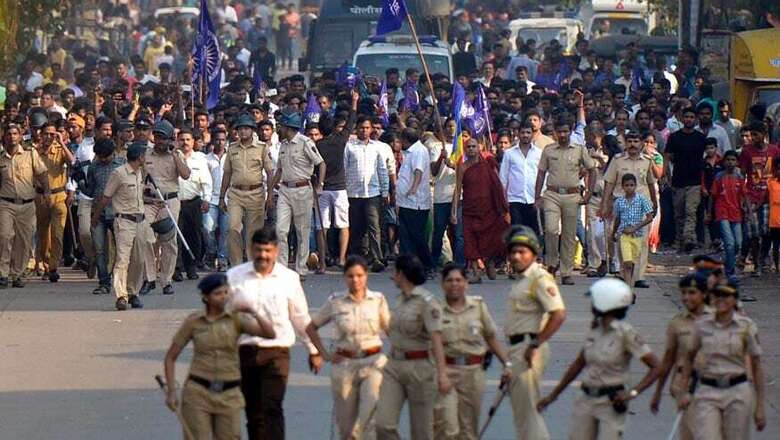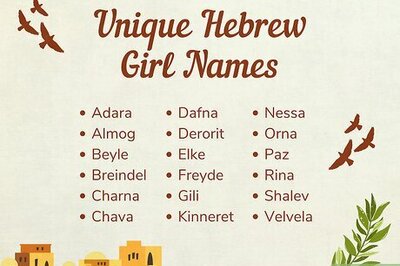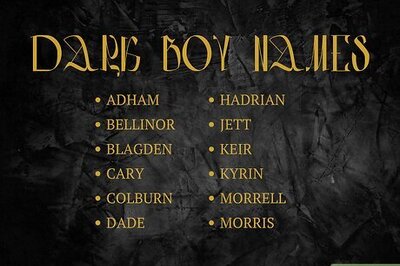
views
At a time when Maharashtra is burning with contesting histories and memories, Dr Prakash Shah, who created quite a stir after he said “caste is a western construct” during a lecture at the Indian Council of Historical Research” had some thoughts on the Bhima-Koregaon battle as well.
Shah, a reader of culture and law at Queen Mary University of London, tells News18.com that “a lot of hatred is being created against upper castes and Brahmins, using history as a means to achieve it.”
Quoting well-known philospher SN Balagangadhara’s ‘colonial consciousness’, Shah demands that the Christian notion of history, as brought by Europeans, needs re-evaluation. He says that we need to question what sense Indians can possibly make of that notion.
Here are excerpts from the interview:
What do you think took place during the Bhima-Koregaon battle? Is it a story of Mahar valour that overthrew the upper caste? Or was it a war between the British and Peshwas?
It is pretty clear that Bhima-Koregaon was a war between the Peshwas and the British, which the latter lost. British records testify to that. People of various Jatis (caste) were involved on both sides. It is incorrect to claim, as contemporary ‘caste warriors’ do, that the so-called ‘lower castes’ like the Mahars of Maharashtra were not given any significant roles in fighting under Chhatrapati Shivaji, Chhatrapati Sambhaji and the Peshwas.
But the Bhima-Koregaon battle commemorates the valour of the oppressed classes in overthrowing the upper castes…
During the Bhima-Koregaon battle, the mercenaries did not perform bravely, so it would be incorrect for the Mahars to take credit for fighting ability. Towards the end of 19th century, the British dropped the practice of recruiting the so-called ‘lower castes’, turning instead to the ‘upper castes’, whom they found more useful for their wars. But we should not forget that historical aspects are being spun during the current conflict by those who want to make trouble by deepening rifts within society and by pitching castes against each other and taking political advantage of the situation.
Do you think there have been distortions in telling this history?
Contemporary caste warriors have a tendency to present facts according to their own versions of oppression. They use the currently dominant but incorrect narrative about the Hindu caste system, according to which they interpret certain factoids. Marxist narratives, for example, tended to present each event in terms of their own dogmas about capitalism, class war, interests of the bourgeoisie and so on. In doing so, they arbitrarily discarded alternative ways of thinking about society and politics. This led to a great deal of violence and oppression in many countries.
Could you please elaborate on the “contemporary caste warrior”?
Contemporary caste warriors have a comparable agenda it seems. Rather than accepting that people of various castes fought on both the Peshwa and British sides, which is documented, they want to present the British side of the war as if it was a Dalit war against the so-called ‘upper castes’. As some people have already observed on social media, this is somewhat like saying that the Indians won both world wars. Certainly, the Indians fought in those world wars, but it was regarded as a victory for the British and their allies, not a victory for India. This comparison gives us an idea of the distorted narrative of the caste warriors. As I said, this spin is being used expediently and insincerely by those who want to create trouble within society.
So, who are these trouble-makers?
It is likely that such trouble is being fomented with the help of foreign countries, their agents and their Indian collaborators. The trouble-makers are well known and easily identifiable due to their connections to past instances of fomenting trouble.
How do you see the empowerment of second-generation Dalits? They are educated and well-versed in technology — so do they have the power to validate their history and struggle?
I cannot make sense of the term ‘second generation Dalit’. If provided the same quality of education and support that should be available to all young Indian people, these so-called ‘Dalits’ can succeed like all others. Unfortunately, the Indian political discourse and the legal system have extended the victim narrative that the colonisers introduced. People have even developed a sense of entitlement to jobs, education etc. on the basis of their caste. This entitlement has now extended to distorting the past in order to suit certain political discourses.
You said you find the term Dalit non-meaningful. Could you explain that?
The term ‘Dalit’, although widely used, is not very meaningful to describe any segment of the Indian society today. It is, in fact, rather misleading. There is an assumption that they are a cohesive group, almost like one caste. This is certainly how a lot of European, American and Indian academics portray the situation. It is unclear to an international audience that ‘Dalit’ generally refers to those who are legislatively classed as Scheduled Castes under Indian law. The place of Scheduled Tribes, which is also a legislated term, is even more ambiguous. The categories basically derive from lists of Jatis that the British created during the colonial period and these have now slipped into common usage, without any serious thinking about what conceptually unites all of them. Therefore, one cannot make any general statement about Dalits as a whole – or any disadvantages or discrimination they suffer. British historian, David Washbrook, records that virtually all the violence in Tamil Nadu against Scheduled Castes was by other lower castes, not Brahmins who have in any case left the villages.
Research done by my colleagues, Dr Dunkin Jalki and Dr Sufiya Pathan of the Centre for Interdisciplinary Research in Humanities and Social Sciences (CIRHS) Karnataka, shows that the incidence of criminal atrocities is actually disproportionately lower against Scheduled Castes and Scheduled Tribes, although that is hardly acknowledged or accurately presented because it goes against the dominant narrative of caste oppression.
Why do you think there are violent reactions over the way we read our history? What is the way forward since we have disparate views on it?
As Prof SN Balagangadhara of Ghent University in Belgium had said, Indians have become cheap imitators of the West when writing history. A set of factoids are linked together chronologically to dish out whatever narrative one feels like. In that sense, history has no scientific basis. The colonisers also told Indians that their history is a mere myth because it wasn’t like the colonisers’ ‘true’ history. That’s when things began to take a sinister dimension. Furthermore, in India, many identity groups have been made to feel as though they need to fashion a set of facts to ensure that their version of events is accepted as the true account.
A sort of ‘war of all against all’ is being fought by identity groups with history being a vehicle to do so. The Christian notion of history as brought by Europeans needs re-evaluation and it needs to be asked what sense Indians can possibly make of that notion. In the meantime, of course, things speed ahead, and there is a tendency, by external agents who want to create a violent outcome, to inflame matters in India. We should look to the Rwandan genocide as an example that should never be repeated. Unfortunately, there are indications that India is moving in that direction. A lot of hatred is being created, especially against upper castes and Brahmins, using history as a means to achieve that. I see this in daily use among academics too. The way their write about upper castes or Brahmins would be completely unacceptable, and in many countries legally actionable.
Could you elaborate on your study "Caste: A Colonial Construct"?
It is unfortunate that a way of thinking about caste, i.e. that there is Hindu caste system which mandated oppression against all those lower down within a hierarchical system, has taken hold of the imagination. I see this as a form of ‘colonial consciousness’, a term also developed by Prof SN Balagangadhara. Protestant missionaries saw Indian society in those terms due to their notions of false religion, which is how they saw Indian religions, with Hinduism being regarded as the most idolatrous. The idea of the hierarchical oppressive caste system or, as one Indian journalist put it a few days ago, the “Hindu caste system’s tyranny”, became a standard way to describe India. We have forgotten that it was the British who built on and implemented the notion in their state affairs and education system.
Could you talk about Balagangadhara’s research programme?
In Balagandhara’s research program, we say there is no such thing as the caste system. We don’t say that it is a colonial construct that later became an Indian reality. We say there has never been and there is no ‘caste system’ in India. Yes, we have Jatis in India but we have very little understanding of their inter-relations or the role they play in Indian culture. The Christian and colonial story, though, is simply untrue. It cannot explain anything about today’s India, although its currency is widespread and it is used to create conflict. This is ‘colonial consciousness’: that Indians have been repeating a western story without being able to access their own culture and traditions.
What was the life of people in lower caste before colonialism? How have things changed?
Unfortunately, we are not in a position to provide any specific answers to this question. We have to conduct research on it very seriously. The prevalence of the Protestant story, which dominates Indian and foreign academia today in the secular form of the social sciences, has meant the exclusion of alternative questions about what Jatis are, how they inter-relate and so on. There are a lot of ad hoc observations about it but these are unscientific opinions. In the dominant version, which we also see in the story claimed to be a successful Mahar assertion, the British colonisers come out as the saviours of the so-called ‘lower castes’. Today, we also tend to regard Christian missionaries as the saviours against the caste system. These accounts are either openly theological (missionary) or they have taken some facts of Christian theology as a true account of India (social sciences), but they have nothing to do with Indian traditions.

















Comments
0 comment